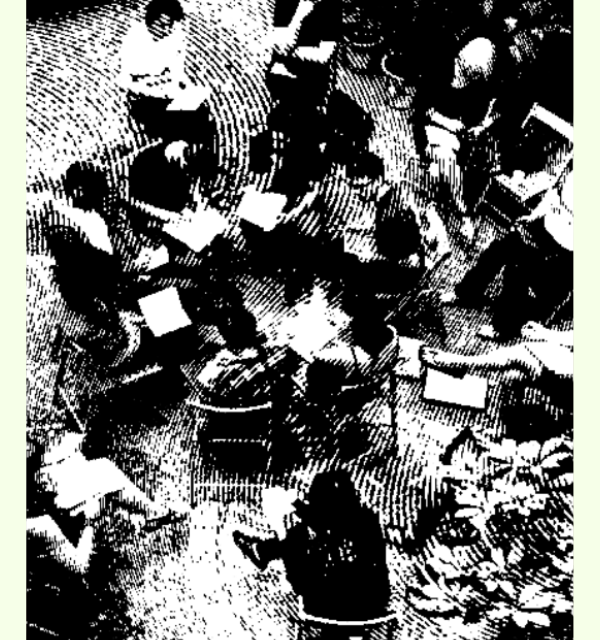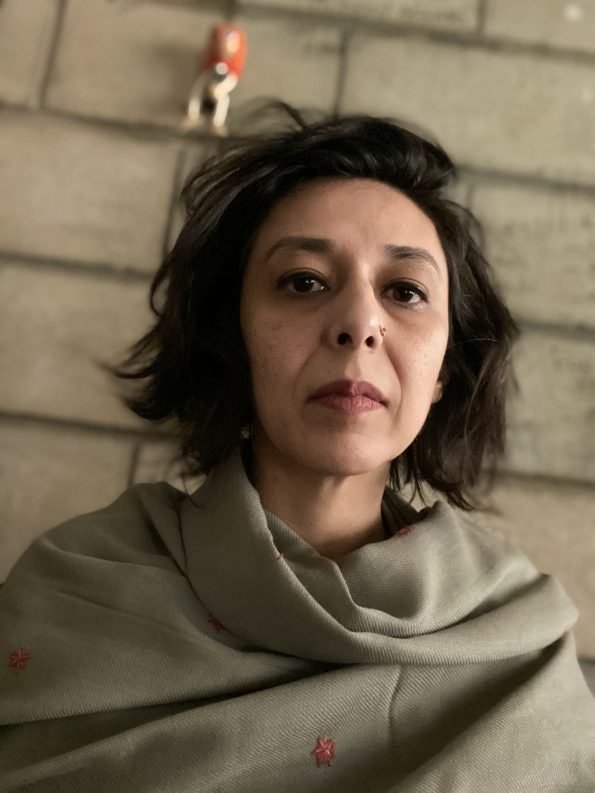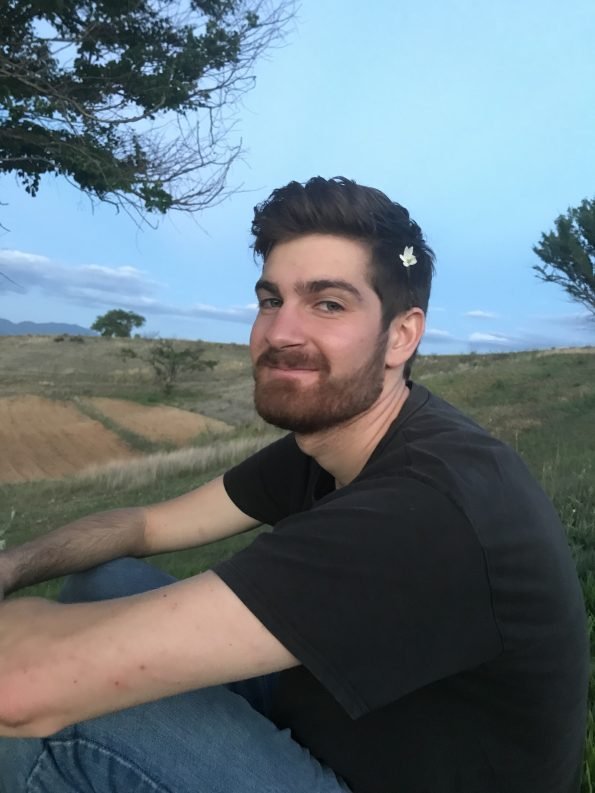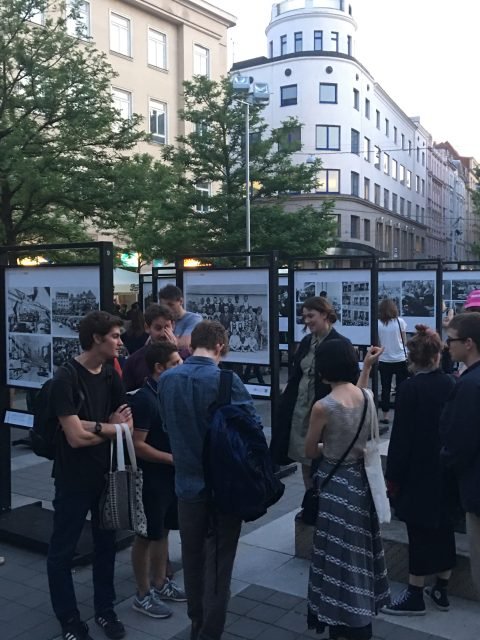Hic Rosa (501c3) founding members and volunteer staff
Organizers & members of the Hic Rosa Collective
…over the years
Asma Abbas is a political theorist, writer, reader, and educator. She is Professor of Politics and Philosophy, and Director of Transdisciplinary and Experimental Studies and the SR Annex, at Bard College at Simon’s Rock. She is associate faculty at the Brooklyn Institute for Social Research, senior research fellow at the Global Centre of Advanced Studies in Dublin, and teaches in the M.Phil. in Art and Design at the Indus Valley School of Art and Architecture as well as at the Bard Early Colleges in Hudson and New Orleans. In recenformer Dean of Academics at the Indus Valley School of Art and Architecture in Karachi, Pakistan. In recent years, she has also served as the Dean of Academics and Professor of Liberal Studies at the Indus Valley School of Art and Architecture in Karachi, Pakistan, and the Fulbright-Masaryk Distinguished Chair in Social Studies at Masaryk University in Brno, Czech Republic. She serves on the Simon’s Rock Provost’s Innovation Council, and is engaged in the design and establishment of the Early College Commons and Press, enabled by a grant from the Open Societies Universities Network, that will be housed at the Simon’s Rock Annex and the Early College Research Initiative. Asma is founding organizer of Hic Rosa Collective (now a 501c3 public charity), the Falsework School for alternative community political education, the ACCREW (art, culture, community, and radical education workers) Caucus of the Democratic Socialists of America, and most recently GCAS-Jehān. She is the author of Liberalism and Human Suffering: Materialist Reflections on Politics, Ethics, and Aesthetics (Palgrave Macmillan, 2010), and Another Love: Overtures to a Politics of the Unrequited (Rowman & Littlefield, 2018). She is also co-curator, co-editor, and designer of Falsework Smalltalk (Common Tern Works, 2021). She is currently working on an experimental political phenomenology titled Anti-Odysseus: Fugues of the Non-Homeric (being supported by the Bard Centre for Human Rights and the Arts) and a series of essays on the “hatred of education” (in the same key as Rancière’s Hatred of Democracy). Her work has been part of several volumes and anthologies, and her essays have appeared in Hypatia, Theory and Event, Democratic Theory, Journal of Politics, Politics and Culture, among others. asmaabbas.weebly.com, asma.abbas@hicrosa.org, asma.abbas@gcas-jehan.org.
Safi Alsebai is a healthcare worker currently based in Upstate New York. His concerns lie in materialist inquiries into biomedical knowledge and history, literary forms, and Islamic thought and aesthetics across various temporalities. He graduated from Bard College at Simon’s Rock with a BA in Politics, Ethics & Aesthetics and Biology. He is an occasional translator of Arabic. Safi is Managing Editor of Common Tern Works.
Wesley Brown is the author of three published novels, Tragic Magic, Darktown Strutters, Push Comes to SHOVE and Dance of the Infidels; several short stories and a collection; four produced plays, Boogie Woogie and Booker T, Life During Wartime, A Prophet Among Them, and Dark Meat on a Funny Mind. He co-edited the multicultural anthologies, ‘Imagining America’ (fiction), ‘Visions of America’ (non-fiction), edited the Teachers & Writers Guide to Frederick Douglass and wrote the narration for a segment of the PBS documentary, W.E.B. DuBois: A Biography in Four Voices. He has been Professor Emeritus at Rutgers University, and professor of literature and creative writing at Bard College at Simon’s Rock. He continues to write, teaches at GCAS-Jehān, and lives in Georgia.
Silvana Carotenuto is an Associate Professor of “Literatures in English” at l’Università di Napoli “L’Orientale” where she directs the Centre for Postcolonial and Gender Studies (CSPG). She writes on Deconstruction, écriture feminine, and cultural, postcolonial and visuals studies. My publications include: “The ‘Vegetarian’ Writing of Han Kang,” In L. Curti (ed), Femminismi futuri (Rome, Iacobelli, 2019); with F. M. Gabrielli, R. JambrešićKirin (eds.), Disrupting Historicity/Reclaiming the future (Naples, UniorPress, 2019); “Translating Africa Elsewhere: The ‘Task’ of Shailja Patel,” in J-B. Ouedraogo, M. Diawara and E. S. Madamo (eds.), Translation Revisited. Contesting the Sense of African Social Realities (Cambridge Scholars Publishing, 2018); “Writing Time: The (Late) Oeuvres of Jacques Derrida and William Kentridge,” English Academy Review, vol. 35 (1) (2018); “The Return of the ‘Great Stranger’: Interrogation, Writing and Sharing of Literature,” in Ritorni Critici (Roma, Meltemi, 2017); “‘Go Wonder’: Plasticity, Dissemination and (the Mirage of) Revolution,” in B. Bhandar and J. Goldeberg-Hiller (eds.), Plastic Materialities: Politics, Legality, and Metamorphosis in the Work of Catherine Malabou (Duke University Press, USA, 2015); “Passages d’innocence: la différence photographique dans l’oeuvre de Jacques Derrida,” Etudes Francaises, Toucher des yeux. Nouvelles poétiques de l’ekphrasis, vol. 51, 2, 2015. She is responsible for the research group M.A.M. and the digital archive “Matriarchivio del Mediterraneo” (www.matriarchiviomediterraneo.org). Her book La pupilla di Demetra. La decostruzione e le arti is coming out in 2021. She has been stuck in Naples since the beginning of March 2020.
Elizabeth Davis is a Ph.D. candidate at the Ontario Institute of Studies in Education (OISE), University of Toronto.
Colin Eubank is a teacher, editor, and organizer splitting time between Oaxaca and Catalina Island. He is passionately involved in community projects around migration and displacement, immigrant rights, and cultural education. He is a member of Hic Rosa and the Falsework School, as well as a co-founder of the experimental publication project Cazuela. Beyond his participation in the dialogues from the Assembling the Future/Tense Studio, his contributions for this manuscript are “March 15, Plague Dreams,” “Toward a Political Education of Mutual Feeling,” and “On the Political Theology of Falseworker as Neighbor: Colin Eubank reads two scenes from La Estrategia del Caracol,” each of which are written with companions (a piece of literature, a conversation/writing partner, a film) to practice political thinking in the present. He is also co-curator and co-editor of Falsework Smalltalk (Common Tern Works, 2021). Colin is member of the core team of GCAS-Jehān, and overseeing the Young People’s Programme and Collective Affairs.
Valerie Fanarjian is an artist, educator, and member of Hic Rosa, and is based in Great Barrington, Massachusetts. Published in Fiberarts Design Book Six, her work can be found in homes and collections across the United States and abroad. Words from faceless voices bracket and inform the space and pages before her. Uncomfortable speaking in what she felt was a hallowed space, she instead spent moments in the Assembling the Future/Tense Studio as a witness: layering ink over tissue, wrapping thread around sticks, roads colliding with the roses of Hic Rosa and becoming red ink In solidarity, untangling and mending, the dialogue of old companions and new friends became her soundtrack to this odd exile of the pandemic. She wishes that, when we all are ghosts and her pictures are ash, the echoes of these days may bring a similar comfort to fellow travelers and crusaders. She serves on the Advisory Board of GCAS-Jehān.
Ciarán Finlayson is the Managing Editor of Blank Forms Edition. He is a member of Hic Rosa and serves on the political education committee of the New York City Democratic Socialists of America’s Central Brooklyn branch.
Ari Fogelson is based in London, where he is currently a student at the London School of Hygiene and Tropical Medicine. He has been active in research and advocacy related to counterterror policing and Palestine solidarity. He is also a Yiddishist, involved in various projects probing the history and present of the Jewish left. He holds a masters degree from Trinity College Dublin’s Irish School of Ecumenics and has an abiding interest in the critical study of Christianity and various colonial and postcolonial intersections of politics, religion, and theology. He is a graduate of Bard College at Simon’s Rock’s BA in Politics, Ethics, and Aesthetics. He is a recent and enthusiastic member of the Islington North Labour Party. A member of the Hic Rosa Collective, he was a participant in the “Assembling the Future/Tense” studio.
Elizabeth Glass is completing her MFA in Actor/Performer training in London. Zibby has worked as assistant and transcriber to Judith Malina of the Living Theatre, the Berliner Ensemble as assistant dramaturg, and had her first play workshopped and published at Le Théâtre du Soleil in their 2015 annual quarterly. Since she has worked with the Odin Teatret in Denmark and Studio Matejka of the Grotowski Institute in Poland, as performer. She participated in and edited/annotated Episode Two.
Lillian Goldberg is a teacher and writer from Philadelphia. She currently teaches English in a Philadelphia public high school and will soon have an M.S.Ed. from the University of Pennsylvania. She also has a B.A. in Political Studies from Simon’s Rock and an M.A. in Comparative Literature from the University of California, Irvine. These days, with her students, she’s learning about change, contemporary poetry, world literature, dystopia, and how to write.
Marvin González is a political organizer and member of the Democratic Socialists of America (DSA) as well as Red Bloom Communist Collective. In DSA he was a founding member of the Emerge Communist Caucus in NYC and serves on the International Committee Secretariat, the national DSA body that oversees diplomatic relationships. In Red Bloom he is a part of the Transit Rider’s Union Coordinating Committee, which is building an independent, democratic, member-run union of MTA riders. He is a rank-and-file member of Campaign Workers Guild (CWG).
Stephen Hager is a musician and artist, and the Director of Chorister Services at Berkshire Choral International. He is part of the core team of GCAS-Jehān and overseeing technology for Falsework School and Jehān.
Sanya Hussain is a Karachi- and Seattle-based visual artist. Since receiving her BFA from the Indus Valley School of Art and Architecture in 2017, Hussain has participated in multiple group shows as well as the Karachi Biennale 2019, and now works at the Seattle Art Museum. Her artistic practice seeks to explore the curious nature of spaces and memory and post-memory with an interest in ideas of home, belonging, and identity. She was managing intern for the Falsework Smalltalk project of Hic Rosa.
Ezra Lee is a farmer based out of the Northeast United States. A simultaneous interest in land use and food production while studying politics as an undergraduate has led into several years of work on various farms in the region, most recently on a 2.5 acre urban education oriented farm. Given the often seasonal nature of agriculture, they spend Winters with family on both coasts of the United States often reading and writing. These seasons of work center questions on food distribution versus production technique, agricultural practices, land access, commodities and class structure, and the farmer as a cultural worker.
Isabella Lee is a law clerk working in plaintiff’s civil rights and employment law litigation. With the onset of the pandemic and eviction crisis she began organizing in the housing justice movement and utilizing her legal experience to provide rights education and counseling for tenants with the Hudson/Catskill Housing Coalition and San Diego DSA’s Tenant Solidarity Network. She will begin law school at UCLA in the fall of 2021, where she intends to embark on a career as a peoples’ lawyer. Isabella is a member of the Hic Rosa Collective and was a participant in the Assembling the Future/Tense studio.
Jody Leonard is a programmer based in the United States.
Nancy Love is Professor of Government & Justice Studies at Appalachian State University. She received a Ph.D. in 1984 and M.A. in 1981 from Cornell University and an A.B. degree in 1977 from Kenyon College. Her teaching and research emphasize political theory, especially critical theory, democratic theory, and feminist theory. She is the author of Trendy Fascism: White Power Music and the Future of Democracy (2016), Musical Democracy (2006), Understanding Dogmas and Dreams: A Text, 2nd ed. (2006), and Marx, Nietzsche, and Modernity (1986), the editor of Dogmas and Dreams: A Reader in Modern Political Ideologies, 4th ed. (2010), and the co-editor of Studying Politics Today: Critical Approaches to Political Science (2014) and Doing Democracy: Activist Art and Cultural Politics (2013). She has also published numerous articles in prominent journals and contributed invited chapters to multiple edited volumes. She recently completed a six-year term as the co-editor of New Political Science: A Journal of Politics and Culture. When she is not working, she enjoys playing with her dogs, tending her chickens, and sharing the beauty of the Blue Ridge Mountains.
Nathaniel Madison graduated with a BA in Political Studies from Bard College at Simon’s Rock. He is a Hic Rosa member, was an intern for the Summer Studio in MAD Politics and Aesthetics in Brno. He participated in the Assembling The Future/Tense series, and worked on the editorial team of Falsework Smalltalk. He has an interest in internationalism, revisionism, and the politics of memory. He manages a food pantry in Troy, New York.
Bindu Menon Mannil is faculty at the School of Arts and Sciences, Azim Premji University, Bangalore, India. Her scholarship and research is positioned at the intersection of Cinema and Cultural Studies, Cultural History and Cultural Anthropology. Broadly her research work can be disaggregated into a history of cinema publics, audio histories, cinema and the non human animal and oceanic Humanities. Her essays in these areas have appeared in peer-reviewed journals such as Biography, Migration, Mobility & Displacement, Bioscope, Journal of Creative Communication, Seminar-India and other edited volumes. She is currently working on her manuscript titled Cine-Assemblages in the Princely State: Senses, Publics and Materialities (1900-1950). She serves in the Editorial board of the journal Studies in South Asian Film and Media (Intellect Journals, UK).
Sara Mugridge is in clinical social work training at Smith College School of Social Work. She received her master’s in Comparative Literature from the CUNY Graduate Center, and has taught and worked in educational spaces for the past decade, including the Falsework School, a site of political education convened by Hic Rosa, of which she is a member. Sara is based in the Berkshires in Western Massachusetts, where she is also a volunteer with the grassroots social and racial justice organization BRIDGE. Sara is a member of the GCAS-Jehān core team, overseeing Student Affairs and the Young People’s Programme.
Daniel H. Neilson is a writer and teacher based in western Massachusetts. He is faculty in Social Studies at Simon’s Rock and holds a Ph.D in economics from Columbia University. Dan is the author of Minsky (Polity 2019), a reading of the works of the theorist of financial crisis. His recent writing is on questions of disciplinarity and meaning in economic theory and practice; an ongoing interest is in the role of monetary institutions and technologies in social reproduction. Dan teaches economics classes that touch on money and banking, debt, international finance, China’s financial system, economic transition and the construction of authority. He is a user of Arch Linux, an opponent of closed platforms, and, in general, a minimalist. Dan is a member of the core team of GCAS-Jehān and overseeing its Finance and Planning.
Lucy Peterson is a PhD student in the Department of Political Science at the University of Michigan, Ann Arbor. In addition to her academic research focusing on feminism and political theory, she is also an activist dedicated to mutual aid project, anti-fascist and anti-austerity organizing, and racial justice.
Brianna Pope is the Three Point Strategies Operations Manager. She is the chief air traffic controller for Three Point and has been vital to the expansion and growth of major events, campaigns, and the financial operation. Brianna has coordinated the Movement for Black Lives Fellowship program, the major volunteer volunteer effort for the She the People Presidential Forum, and even served as the Inte hi rim Campaign Manager for Lesley McSpadden for Ferguson City Council Campaign. Brianna is a playwright, fiction writer, and avid reader. She is a graduate of Bard College in Upstate New York and was born and raised in San Diego California. She is made up of California sunshine, sarcasm, abundance, naps, text love letters with her sister, and cooking the perfect steak.
Anna Poplawski is a writer currently based in Chicago. Her written contribution to this project follows from her other work on questions of value, patriarchy, race, and subjectivity.
heidi andrea restrepo rhodes is a queer, Colombian/Latinx, disabled, poet, scholar, and cultural worker. Her poetry collection, The Inheritance of Haunting (University of Notre Dame Press, 2019) is a meditation on themes of inter-generational and collective inheritances of historical memory and post-colonial trauma, the responses they elicit, the forms of refusal, life, and love, that emerge in their wake. A 2021 Radar Productions Fellow, a 2019 CantoMundo Fellow, and 2018 VONA alum, her poetry has been published in Poetry, Academy of American Poets Poem-a-Day, Split This Rock’s Quarry, Nat.Brut, and Foglifter, among other places. With a background in creative and performing arts, and anthropology, she is a doctoral fellow in political theory. Her dissertation is titled, “Afterlives of Discovery: Speculative Geographies in the Colombian Political Landscape.” Born in Arizona, and raised in California, she currently lives in Boston.
Vianny Ruiz is a Oaxacan artist that works on a number of traditional and digital mediums. As a student, she attended Centro De Educacion Artistica “Miguel Cabrera” (CEDART), Centro Fotografico Manuel Alvarez Bravo (CFMAB), and Centro de Las Artes de San Agustin (CASA), where she developed her interest and techniques in mixing Oaxacan culture and arts. Her contribution, a collage entitled “what would the world be without accomplices?,” juxtaposes ongoing social movements across Latin America and the tactics and principles that inform their respective notions of feminism, cultural combat/preservation, and political performance.
Gabriel Salgado is a PhD Candidate in the Department of Political Science at the University of Pennsylvania. His research focuses on issues of race, colonialism, and temporality in Latin America.
Yashfeen Talpur is a graduate of the Indus Valley School of Art and Architecture, with a degree in B. Arch. Her thesis project, titled Urban Subjects, focuses on the production of urban space that re-centers the everyday user as its primary subject and author, as opposed to capital which aids the production of abstracted space. Her contribution to this manuscript, other than as speaker and scribe for Episode 4, stemmed from a desire for sharing and building space–space that would hold personal inquiries that are undeniably tied into and with the collective. As such, her written piece, “Tracing Feeling” (appearing in the Sixth Interlude: Windows/Breath) is an exploration of personal positionality within the larger political moment that marked the year with themes of isolation and alternate ways of coming together,restructured relations, and the constantly shifting lines of exchange between the two. In addition to writing, Yashfeen practices thinking, making and feeling through the mediums of visual art and poetry. She is currently based in Karachi, Pakistan. She is the central designer and illustrator for GCAS-Jehān.
Milo Ward is a PhD candidate in political theory at the CUNY Graduate Center. He is currently working on James Q. Wilson’s political theory of the police.
Hic Rosa
Hic Rosa came together in 2015. It curates educational and aesthetic experiences crossing boundaries of genre and place, in the service of philosophical and intellectual provocations that dismantle the walls between teacher and student, artist and audience, participant and observer, to produce radically intimate collectivities of thought and practice. It supports collaborative publication, broadcast, and dissemination of commentary, critique, and work that strengthens links between thought and expression towards transformative action. Our enrichment takes on a personal yet global scope by mentoring and encouraging participants to access networks of artists and thinkers with shared vocations across the world, and collaborating with other organizations. Our initiatives seek to provide time and space for intellectual engagement and developing conversations under conditions of rampant crises, when they all too often get sacrificed in urgencies and exhaustion of fixing broken worlds in the face of economic, political, and social inequalities and injustices. By linking artistic, cultural, political, and intellectual struggles, and projects around the world to each other, Hic Rosa necessitates a study of what connects us and, also, what keeps us apart in projects of similar intellectual and aesthetic inflection. It is our hope that incorporating critical and humanistic thought and action into our lives will educate toward overall sensibilities that are more just, fair, and hospitable in this troubled world.
Who are the Hic Rosa Collective?
We come together to convoke a platform for thought, action, provocation, production, respite, and recovery in the realms of aesthetics, poetics, and politics and their common material bases. What unites us is attentiveness to the methods and processes that irrevocably link everyday life with knowledge and cultural production, and we are interested in ventilating and revivifying the politics suffocated by moralistic or order-conserving foreclosures of thought, inquiry, critique, form, expression, and action. From the manner in which we organize ourselves in this collective, to the form and content of what we put out in the world, we seek to manifest a mode of solidarity and practices of counter-productions in art, education, and politics that are accountable to histories of exclusion and marginality, histories that are by turns a benign or insidious mockery of humanity, but more often maddening and murderous. Some of this work requires going “off the grid” in the manner of traversing planes of collaboration and coexistence, in the face of many arguments to the contrary, that link up the poetics and aesthetics of survival and reclamation: via the proliferation of productive and liberatory proximities between unsuspected partners across the world whose struggles call to be connected to and embraced by each other. To this end, our work is attentive to its actual, intersecting, and intended geographies.
We are all fortunate to have emerged from educational backgrounds that made us think about education and institutions, as well as from particular political contexts that compel the bringing about of a new possibility, certainly beyond what is scripted by dominant institutions whose legitimation we cannot help having sought, but also beyond what many of our particular affiliations and homes to which we are often told to return have scripted for us. So, some of our faith in taking time, conspiring meaningfully and even joyfully, and resisting the sabotage of the loudest threat is owed to these spaces, as flawed and complicit as they may be, and it is a privilege we choose not to unlearn. However, this is not a naïve or flamboyant act, even if it is one of abundance in the face of austerities: it is an act that accepts, in the words of Langston Hughes, that there is “no such home,” and also as Aziz tells Fielding at the end of A Passage to India that we cannot be friends, not here, not yet. And then there are always the women who disappear into walls at the end of stories or are killed before the “real” story begins, or the refugees who make the border their home, who remind us that only the outsider ever has a real stake in making something fit enough to be home, and often the homes may not claim them back. So, in these impossibilities of time and space, we hope to invite, convoke, and conjure, scenes of possibility.






